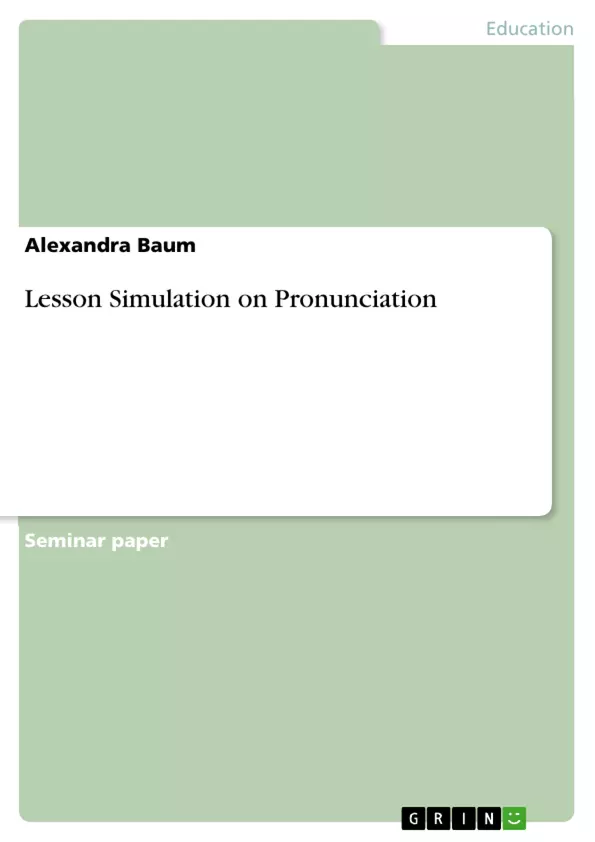When it comes to teaching English Pronunciation in the classroom a lot of teachers feel reluctant. The reasons might be a lack of instruction during their own studies of English or even a personal struggle with the topic because of its complexity and the fact that they are non-native speakers of English. Finding a good introductory lesson that evolves around one of the topics of pronunciation seems to be rather challenging. That might be because although a lot of the textbooks for learners of English offer some small exercises on pronunciation they do provide teachers with enough material to add-on to the units or to create a whole lesson. So even nowadays to find an English learner’s classroom where pronunciation is taught in on a regular basis is a wishful thinking. Teachers have be aware of the fact that exercises on sounds, word and sentence stress, intonation and connected speech (elision and liaison) need to be part of the English lesson in order to prepare their students for the actual use of the target language in the real world without the protecting walls of the classroom.
The fact that pronunciation is a part of language acquisition has long been neglected. It was seen as the finishing touch of learning English and therefore stood at the far end of the line. If students were highly motivated they went abroad or looked for a tandem partner to learn how to speak good English. But as prospective teachers me know of the importance of pronunciation and that students of the English language need to be introduced to its rules right from the beginning of the learning process. To speak an understandable and fluent English is a great part of mastering the language and therefore must not be neglected.
Therefore, pronunciation is a highly important aspect of teaching English not just since it is part of the basic criteria needed to successfully communicate with native speakers of the but also to round off the skill of knowing English.
Table of Contents
- Introduction
- Planning of the lesson
- Learning targets
- Rationale behind the structure and contents
- Summary of the lesson simulation
- Outlook
- References
- Appendix
Objectives and Key Themes
This lesson simulation aims to provide students with a comprehensive revision of English pronunciation, addressing common difficulties encountered by German learners. The simulation focuses on enhancing pronunciation skills through theoretical explanations and practical exercises.
- The importance of pronunciation in acquiring fluency and understanding
- Mastering the International Phonetic Alphabet (IPA) and its application in pronunciation
- Understanding the role of word stress and its patterns in English
- Utilizing authentic English materials, such as tongue twisters and poems, to apply and improve pronunciation skills
- Encouraging active practice and engagement in developing pronunciation skills
Chapter Summaries
The first chapter provides a detailed introduction to the challenges faced by teachers when teaching English pronunciation, highlighting the need for dedicated lessons and materials. It emphasizes the importance of pronunciation in achieving fluency and effective communication in English.
The second chapter dives into the planning and structure of the lesson. It outlines the learning targets for the lesson, covering topics such as the IPA, consonant and vowel sounds, word stress patterns, and applying pronunciation knowledge to authentic materials. This chapter also provides a rationale behind the lesson's structure and content, emphasizing the coherence and progression of the learning process.
The third chapter summarizes the lesson simulation, highlighting the key aspects covered, including the theoretical explanations of pronunciation concepts, the practical exercises designed for German learners, and the utilization of authentic materials to promote pronunciation development.
Keywords
This lesson simulation focuses on key concepts related to English pronunciation, including the International Phonetic Alphabet (IPA), consonant and vowel sounds, word stress, authentic materials, and the challenges faced by German learners. The simulation aims to equip students with the necessary skills and knowledge to improve their pronunciation and achieve fluency in English.
- Arbeit zitieren
- Alexandra Baum (Autor:in), 2014, Lesson Simulation on Pronunciation, München, GRIN Verlag, https://www.grin.com/document/286154



